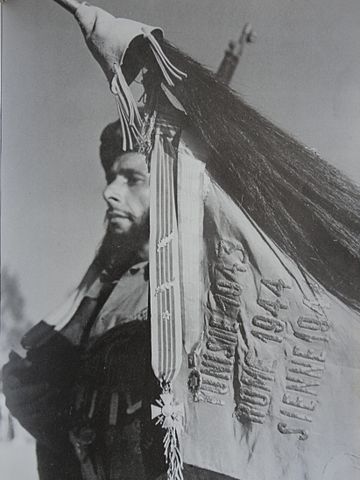
October 1, 2013, by Harry Cocks
Muslim Soldiers of France
In Rachid Bouchareb’s 2006 film Indigenes (literally meaning “natives”, but also the term for French colonial subjects – the film was released to English-speaking audiences with the more conventional-war-film title Days of Glory), four Algerian men, Yassir, Said, Abdelkader and Messaoud, sign up to fight for the Free French after the defeat of the Axis in North Africa. As they battle their way through military training at the hands of the tough pied-noir Sergeant Martinez, and distinguish themselves in the gruelling Italian campaign, they face not only the enemy but ill-treatment and prejudice from their own side. They and their fellow African soldiers (fighting in segregated regiments) are deployed on costly and impossible missions, sent to draw fire in order for their commanders to identify German positions, while at the same time refused proper service in their own military canteens and given humiliating tasks when out of the line. Three of the four men are killed in the climactic battle of the film in the liberation of Alsace, and the only survivor of the group, Abdelkader, is snubbed by a newsreel crew only interested in the tidy but untested white French recruits who have just arrived at the front. The film concludes with the elderly Abdelkader visiting the graves of his fallen comrades before returning alone to his dingy flat in a poor neighbourhood. There follows a caption reminding the audience that the pensions of Algerian soldiers were stopped in 1959, leading to the kind of poverty that the hero faces. The clear message of the film is that the contribution of these soldiers, and of colonial soldiers of all kinds to the French war effort, was barely recognised by the French state and had been almost completely forgotten. However, a new article by Dr Karen Adler of Nottingham’s History Department (see link below), argues that the figure of the Algerian indigene soldier was far from absent in contemporary accounts of the war, and instead was “a familiar, even glorified figure” inside the French military. Looking at the magazine published by and for the army of occupation in Germany after victory in Europe, which ran from 1945-1955, Dr Adler shows that colonial soldiers were continually present. Also the hardy heroism of the North African soldier, who was said to have fought in all conditions and often (in spite of Napoleon’s famous dictum) on an empty stomach, was celebrated, albeit in a way that essentialised such deeds as the natural outcome of a harsh rural background and a fatalism that was seen to emerge from their Islamic faith. Not only that, but the so-called cafe maure (moorish cafe), an established feature of the North African city, was recreated in military camps, providing a recognised space for colonial soldiers to socialise and relax. In this way, Dr Adler shows that the North African soldier, far from being marginalised and forgotten, was a key element of the French army’s own history of its wartime exploits. The necessities of wartime frequently disrupted racial and cultural boundaries, and we should not simply project current national and racial dilemmas back onto the past.
K. H. Adler (2013) “Indigènes after Indigènes: post-war France and its NorthAfrican troops”, European Review of History: Revue europeenne d’histoire, 20:3, 463-478.
To link to this article: http://www.tandfonline.com/doi/abs/10.1080/13507486.2013.770826#.Ukqc49I3vTo
No comments yet, fill out a comment to be the first

Leave a Reply